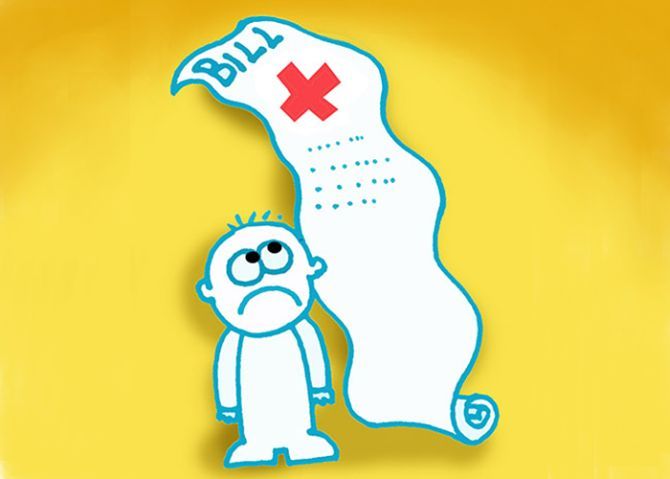Govt could cut the GST rate payable every time someone buys a health insurance product; or it could also provide a larger income tax set off for those who buy a health insurance product.
Illustration: Dominic Xavier/Rediff.com

Health insurance premiums could get larger tax breaks, as the finance ministry has asked the apex body of general insurance firms to examine the proposal for the Budget 2018-19.
The government is willing to consider the demand, since health insurance costs have moved centre stage in the policy circles.
The Narendra Modi-led government is pushing for insurance-based healthcare. While the governments at the states and the Centre subsidised a large percentage of premium for people below the poverty line, costs spike for those above it.
Under the National Health Policy 2017, the government is planning to bring a national-level health protection scheme, a key component of which will be cheap health insurance products.
There are two areas where the government could intervene through the Budget - it could cut the GST rate payable every time someone buys a health insurance product; or it could also provide a larger income tax set off for those who buy a health insurance product, provided under Section 80D of the Income Tax Act.
The umbrella body of insurers, the General Insurance Council, has met the revenue department in the finance ministry to push for inclusion of both options in the Budget 2018-19.
Finance Minister Arun Jaitley will read the Budget in the Lok Sabha on February 1.
Sources close to the Council said the ministry appeared more keen towards the option of income tax set off.
Under the current law, anyone who buys a medical insurance policy can get a tax waiver of up to Rs 50,000 per year.
The tax benefit covers parents, self, spouse or dependent children.
One of the sources said the Finance ministry has asked the Council to clarify if there is any profit element to the insured, if the insurance cover is raised.
“Among various types of products (indemnity as well as benefit), the key question we have to answer is if there is any element of profit to the policyholder for these health insurance claims,” said the source.
The government wants to ensure that there is no room for anyone to abuse the policies like those which offer cash support for the days a patient is hospitalised or provide a lump sum payment.
The government has reasons to be careful as there have been cases reported by the third party administrators where some of the elements of the medical cover were used by hospitals and patients to soak up on insurance.
Consequently, the finance ministry and the insurance regulator want to ensure that just like tax deduction would be available for the premium paid when buying an insurance policy, there should be modalities to tax any income or profit made by the policyholder at the point of claim payout.
KK Srinivasan, former member (non-life) at insurance regulator Irda, however, said: “If the government is moving away from universal healthcare to insurance-based healthcare, then there should be no tax on the premium paid.”
A CRISIL estimate shows health insurance accounts for 24 per cent of the gross premium of all the general insurance companies, just after motor, for financial year 2016-17.
Among the private sector companies, the percentage is smaller at 12 per cent of the gross premium. Because of the perceived high claims ratio in group health insurance, private sector companies have been reluctant to enter the field.












 © 2024 Rediff.com -
© 2024 Rediff.com -